‘Cries From Syria’ Carries Heart-Rending Stories From the Civil War
Evgeny Afineevsky’s Oscar-nominated documentary doesn’t shy away from the war's brutal realities. The children’s voices are especially poignant.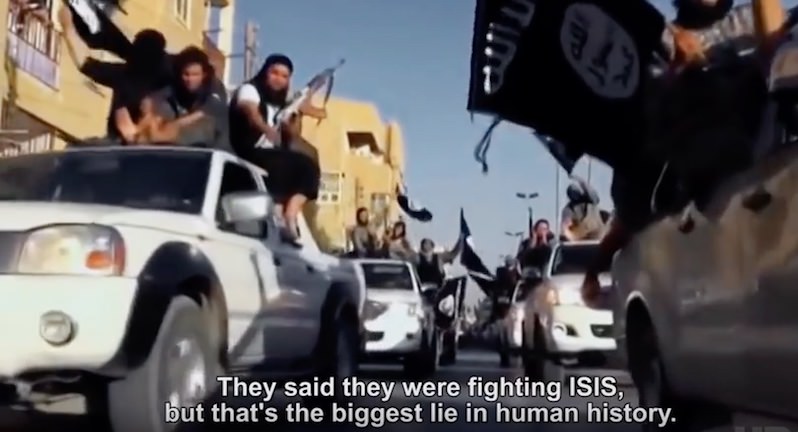
A still from Evgeny Afineevsky’s documentary “Cries From Syria.” (HBO Documentary Films via YouTube)
Most people don’t know his name. But they are familiar with the image of little Alan Kurdi lying facedown in the sand on a Turkish beach as the surf laps around his lifeless body. He was just 3 years old when he died, as his family, like so many others, attempted to escape the civil war that has ravaged their homeland of Syria. The war has claimed 400,000 lives and displaced millions. When the image made the front pages across the globe in September 2015, it was for many people a shocking wake-up call about the horror of a war that had been raging for four years, affecting civilians and children in particular.
When Evgeny Afineevsky’s new documentary, “Cries From Syria,” was screened at the Sundance Film Festival in January, many found it gripping but gruesome, with its candid depictions of dead and mutilated children, beheadings and torture.
“My goal was to bring light to something that we, the rest of civilization, have a lack of knowledge about, which creates a fear of these people,” Afineevsky told Truthdig about the film, which opened in Los Angeles Friday and will open in New York March 10, just before its March 13 HBO premiere. “My biggest goal was to bring the knowledge to the United States, the European Union, so people can understand why these people are fleeing their homes and what their choices are. To stay in Syria is to die in a government prison, to die in Daesh [Islamic State] camps, to die at the hands of other invaders.”
Afineevsky uses footage from various sources—civilian smartphones, video cameras and underground news feeds—edited with hundreds of interviews he conducted with activists including soccer star Abdul Baset Al-Sarout and journalist Kholoud Helmi, editor and co-founder of the underground newspaper Enab Baladi.
Also interviewed are Riad al-Asaad, a former colonel in the Syrian Air Force who defected to help establish the Free Syrian Army rather than target his own countrymen; and Ghaith Matar, nicknamed “young Gandhi” for his strict allegiance to nonviolent protest. Matar was later tortured and killed, after offering water to overheated guards.
Even more heartbreaking are the interviews with children. A 12-year-old girl reads her last will and testament, which she wrote “just in case.” A 10-year-old boy asks the camera: “Where is the humanity? How can you see this genocide and still keep silent?”
When Syrian President Bashar Assad took office in 2000, many hoped he would be a reformer. But the documentary shows that those hopes were smashed during the Arab Spring in 2011 after the arrest of a group of schoolboys who had spray-painted on a wall, “It’s your turn, doctor,” a reference to Assad’s medical training in the United Kingdom. They were rounded up and tortured, their fingernails extracted. In the case of young Hamza Al-Khalb, his genitalia were cut off before his mutilated corpse was returned to his parents. The peaceful protests that followed were met with ruthless military repression, which escalated into the civil war that still rages.
By spring 2013, momentum had begun to shift in favor of the rebels. Assad responded by releasing radical extremists from prisons and appealed to external groups like Hezbollah, al-Qaida and sectarian Iraqi, Iranian and Afghani militias. Islamic State, in particular, was keen to step into the power vacuum, assuming control of the eastern Syrian city of Raqqa and beginning a brutal reign of terror. In the film, a woman is shown being beaten for not covering her face, and we learn that another man was beheaded for smoking. Such executions, some captured by cellphone in the streets, sent a chilling message to the city’s helpless citizens.
The horror of those scenes is matched by the horror in footage at a makeshift hospital in Ghouta, where infants, children and the elderly foam at the mouth, convulse and die after Assad’s infamous sarin gas attack. Roughly 1,500 people died, most of them women and children.
It was the red line in the sand that President Obama had dared Assad to cross. Yet when he did, the U.S. did nothing in response. Obama was reluctant to engage in war without United Nations consensus, having learned that the British Parliament would not back Prime Minister David Cameron should he decide to commit forces in Syria and that the Germans would abstain altogether. This was before the 2016 Russian deal with Assad resulted in illegal cluster and phosphorous bombings, further devastating the population.
“Many think that wars are fought between men. But as we can see, in our day, that is not always the case,” Afineevsky said. “No matter what you feel about the situation, the suffering is inhuman. It’s one of the reasons that I tried to focus on the kids. We are the people, and we have the ability to pressure our government.”According to the film, 2.7 million Syrian refugees have settled in Turkey and a million others throughout Europe. The U.S. accepted 10,000 under Obama and promised to accept 100,000 refugees from other nations around the world. But that decision was reversed by Donald Trump, who declared Syrian refugees, about two-thirds of whom are women and children, a terrorist threat, including them in his seven-nation travel ban.
A Russian immigrant to the U.S., Afineevsky enjoyed a prolific career in Israel directing musical theater before moving into documentary film and television. “Winter on Fire,” his 2015 film on the crisis in Ukraine, earned him an Oscar nomination, as did “Cries From Syria,” one of several movies on the refugee crisis nominated at this year’s Academy Awards. He didn’t win, but “White Helmets,” about a group of teachers, doctors, carpenters and other civilians who rush into the aftermath of bombings to free victims trapped in rubble, won for best documentary short subject. Unfortunately, the heroes depicted in the movie were precluded from attending the ceremony because of President Trump’s travel ban.
“My hope is that all these people working in the government, even our new president — he is a parent, and the movie talks through the voices of the kids,” Afineevsky explained. “We, in America, have the freedom of speech. And in Syria, they’re fighting for it. It serves as a reminder of what our forefathers in the United States stood for. They sacrificed their lives for the freedom of speech and democracy.
“And we can’t forget these things … we have a tendency to take these things for granted. For me, seeing all these events, I can tell you one thing: It can happen anywhere in the world.”
With an uncertain future and a new administration casting doubt on press freedoms, the danger is clear: The truth is at risk.
Now is the time to give. Your tax-deductible support allows us to dig deeper, delivering fearless investigative reporting and analysis that exposes what’s really happening — without compromise.
Stand with our courageous journalists. Donate today to protect a free press, uphold democracy and unearth untold stories.

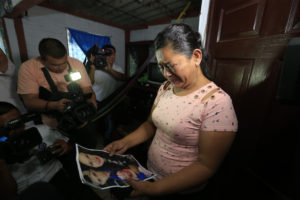
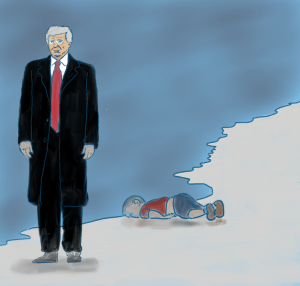
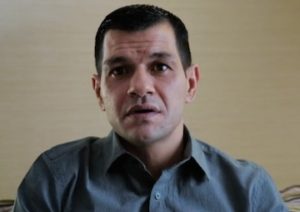
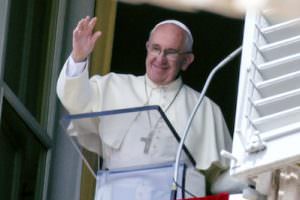
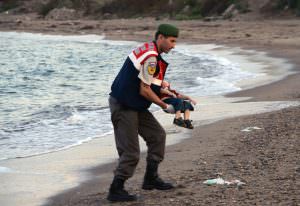


You need to be a supporter to comment.
There are currently no responses to this article.
Be the first to respond.